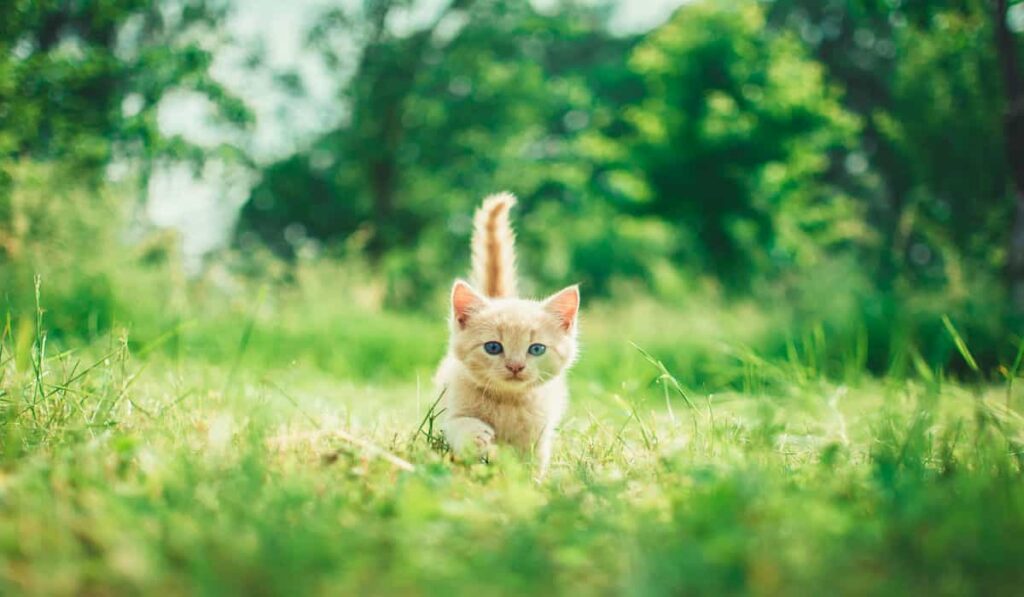Wondering, “Why is my cat always throwing up?” or “Why does my cat throw up every day?” If you’re a concerned cat owner, these questions may have crossed your mind. It’s not uncommon for cats to vomit occasionally, but frequent and persistent vomiting can be a cause for concern. In this blog, I’ll explore the common reasons behind your cat’s frequent vomiting and provide you with insights to help you address this issue. Let’s dive straight into understanding the potential culprits behind this recurring problem.
Why do Cat Vomits?
Cats might throw up for various reasons, and not all of them mean they’re sick. If your cat vomits right after eating, it could be because they ate too quickly or too much. Sometimes, a change in their diet or eating something unusual like a rubber band or string can trigger it.
Hairballs are another common culprit. Cats with long fur or those who groom themselves often can get clumps of fur stuck in their stomachs. It’s normal for them to vomit a hairball occasionally to prevent blockages, but it shouldn’t hurt them. To make it easier, you can brush your cat regularly or use special supplements.
There are more serious reasons for vomiting, though, such as:
- Objects in their stomach that don’t belong there.
- Food allergies.
- Ingesting something toxic.
- Intestinal parasites.
- Inflammatory bowel disease.
- Diabetes.
- Overactive thyroid (hyperthyroidism).
- Kidney problems.
- Cancer.
These conditions can be dangerous, but catching them early and treating your cat can help them stay healthy and happy for a long time.
Causes of Frequent Vomiting in Cats
Hairballs can sometimes make your cat throw up. This happens more often in longhair cats or those who groom themselves often. It’s okay if your cat coughs up a hairball once in a while because it helps prevent tummy blockages. It shouldn’t hurt your cat when they do this. To make it easier, you can brush your cat’s fur regularly or use special supplements you can buy without a prescription.
But if your cat vomits for other reasons, it might be more serious. Things like foreign objects in their tummy, food allergies, or even poisoning can make them throw up. There are also illnesses like intestinal parasites, inflammatory bowel disease, diabetes, hyperthyroidism, kidney problems, or even cancer that could be the cause. These can be dangerous, but if you catch them early and get your cat treated, they can still have a long and healthy life. So, if your cat is vomiting a lot, it’s best to see a vet to find out why and get them the help they need.
Food Allergies in Cats
Hairballs can be a reason for your cat’s vomiting, especially if your cat has long hair or grooms a lot. It’s normal for them to cough up a hairball now and then to prevent tummy troubles. This usually isn’t painful for your cat. To help, you can brush their fur often or use special supplements.
But there are more serious reasons for cat vomit, like:
- Swallowing things they shouldn’t.
- Food allergies.
- Eating something poisonous.
- Having tummy parasites.
- Dealing with bowel problems.
- Having diabetes.
- Having a hyperactive thyroid.
- Kidney troubles.
- Cancer.
These issues can be serious, but if you catch them early and get help, your cat can have a long and healthy life. So, always keep an eye on their health! 🐱👀
Parasites in Cats
This kind of vomiting happens more often in baby cats (kittens) but can happen to pets of any age. Sometimes, pet owners might even spot live worms in the vomit. The good news is that when you treat the parasites, it usually stops the vomiting. So, there’s a way to make your furry friend feel better! 🐾🐛
Feline Inflammatory Bowel Disease 99% in Cats
Another reason cats might throw up is something called feline inflammatory bowel disease. It often comes with tummy troubles like diarrhea and losing weight. This disease can happen in different parts of a cat’s belly, like the stomach (gastritis), the small intestine (enteritis), or the large intestine (colitis).
Hairballs in Cats
When cats lick themselves, their scratchy tongues can pull loose fur from their fur coats, and sometimes, they swallow it. This can create a bunch of hair in their stomach, and eventually, they might cough up a hairball. It’s quite common and usually not a big concern. However, if your cat gets hairballs a lot, it’s a good idea to talk to your vet. Sometimes, it could signal a tummy issue that needs checking.
Pancreatitis in Cats
When your pancreas gets swollen and angry, it can make you feel pretty sick. You might throw up, feel tired, have a runny tummy, get a fever, and not want to eat or drink anything.
Chronic Kidney Disease 99% in Cats
Lots of older cats get something called chronic kidney disease (CKD). Our kidneys have an important job: they clean our blood, balance our nutrients, and help control blood pressure. When cats have CKD, they might throw up, feel tired, have tummy troubles, lose weight, or drink more water than usual. CKD gets worse over time, but if we catch it early and take action, it can make our cats feel better.
Diabetes in Cats
When a cat has diabetes, throwing up is something that can happen, and it’s often one of the first signs that something might be off. There are other signs to watch for, too, like your kitty drinking and eating more than usual, peeing a lot, losing weight, and feeling weaker. So, watch for these clues if you’re worried about your cat’s health.
Poisoning in Cats
Sudden vomiting in your pet can also be due to poisoning, and that’s a
serious situation. There are a few common things around the house that can be harmful:
Antifreeze: Some antifreeze has a sweet taste, which can be tempting to cats and dogs. If they consume it, they might show signs like nausea and vomiting. To prevent this, use antifreeze that contains propylene glycol, a non-toxic option.
Other Household Toxins: Things like human medicines, strong cleaning products, bug sprays, and weed or pest control products for your yard and garden can be harmful to pets.
Pet Food Recalls: If you hear about a pet food recall, pay attention. Sometimes, the food can contain dangerous toxins. Check if you have any recalled brands at home, and if you do, follow the recall instructions and get rid of them immediately to keep your pet safe.
Treatments for a cat who’s throwing up 98% in Cats
The way to help with vomiting depends on what’s making you or your pet feel sick. There are many reasons for this, so we can’t cover them all here. But we can share some general tips on how to treat it.
Fluids
If the vet checks your cat and doesn’t find any health issues, and there are no big concerns in your cat’s history, they might decide to give some treatment that helps with the symptoms. One way they might do this is by putting fluids under your cat’s skin, even if she doesn’t seem severely dehydrated. This helps clean her system and keeps her hydrated.
When cats throw up, they lose fluids, leading to mild dehydration. Dehydration makes cats feel bad, and they don’t want to eat or drink, which can make them vomit more. This cycle continues, and they become even more dehydrated.
For most cases of vomiting, some fluid therapy is usually given. If a cat is very dehydrated or weak, the vet might recommend giving fluids through a catheter in a vein (IV fluids). It’s a direct way to provide fluids, and more can be given throughout the day. But keep in mind IV fluids are more expensive, and your cat may need to stay at the vet’s office for this treatment. However, in severe dehydration cases, it’s necessary because fluids given under the skin (subcutaneous fluids) might not work as effectively.
Anti-vomiting medication in Cats
To help stop vomiting in cats, one common therapy is to give them a special medicine that stops the vomiting (anti-vomiting medication). This medicine not only stops the vomiting but also helps reduce the loss of fluids. It can also ease tummy discomfort and make the cat feel more like eating. Sometimes, vets might use stomach-protecting medicines like Pepcid or sucralfate, although their effectiveness is debated. These medicines usually don’t cause any harm. If the anti-vomiting medicines don’t control the pain well enough, the vet may also add a pain medicine to the cat’s treatment plan.
Diet changes in Cats
When your cat has a tummy upset and is throwing up a lot, changing their diet can help. If it’s a short-term issue, you might switch to easy-to-digest foods like special cat food or plain, cooked chicken (without any onions or garlic). But remember, these aren’t complete diets for cats, so only use them for a few days.
For cats who throw up regularly, changing their diet can be a treatment and a way to discover what’s causing the problem. If the new food stops the vomiting, it might mean your cat has a food allergy or a mild tummy problem. If you’re trying a diet change for a cat with chronic vomiting, stick with it for a few weeks to see if it helps. Your cat should be eating one of those special prescription diets or a limited-ingredient prescription diet to ensure it’s effective.
Prednisone in Cats
As mentioned earlier, some cats might vomit because of inflammatory bowel disease. To treat it, vets often use a medication called prednisone. But please don’t try giving prednisone to your cat without getting some tests done by the vet first. Prednisone can have many side effects, like making your cat thirsty, causing more trips to the litter box, weakening their immune system, and making their muscles less strong. Plus, it can make some other reasons for vomiting, like pancreatitis, diabetes, or kidney problems, even worse.
However, if your cat’s blood tests and X-rays look normal and you don’t want to do more tests, you can talk to your vet about trying prednisone. But it’s super important to chat with your vet about all the possible risks before you decide. 🐱🩺
Conclusion
In conclusion, understanding “Why is my cat always throwing up?” and “Why does my cat throw up every day?” can be crucial for your feline friend’s well-being. Cats may vomit for various reasons, from dietary issues to underlying health concerns. It’s essential to monitor your cat’s behavior, consult with a veterinarian when necessary, and make appropriate adjustments to their diet and lifestyle to alleviate the issue. By following these guidelines and taking prompt action, you can help ensure your cat enjoys a healthy and comfortable life, free from the distress of frequent vomiting.




